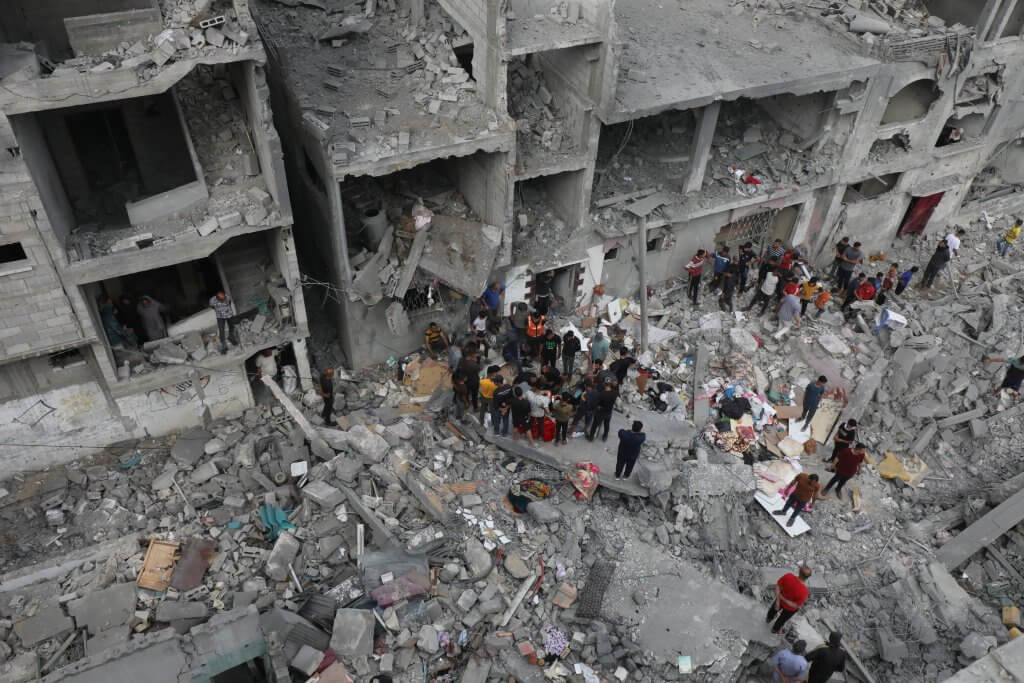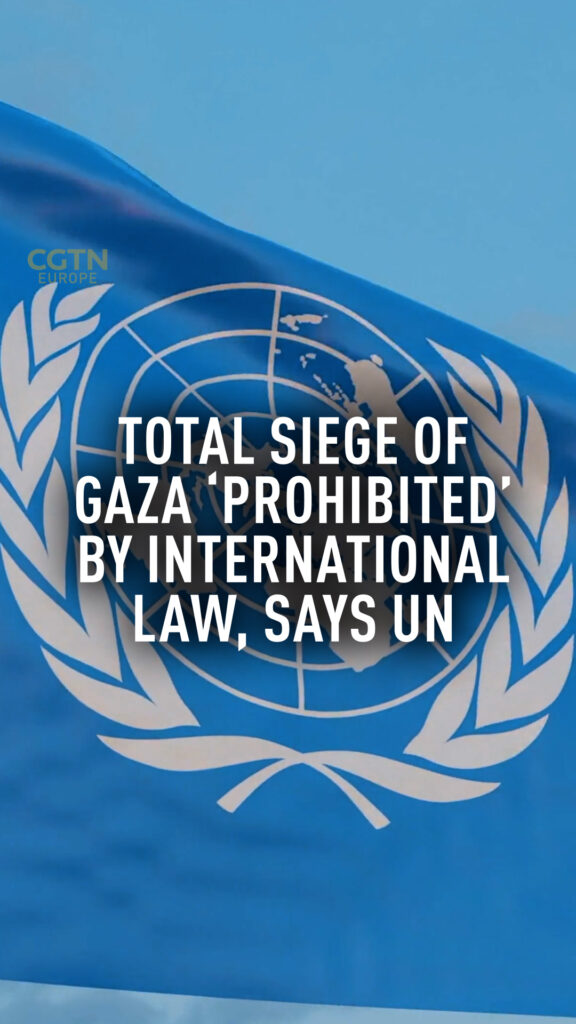How Israel Violates International Law in Gaza: Expert Report
PALESTINE ISRAEL GAZA GENOCIDE, 13 May 2024
Steve France | Mondoweiss - TRANSCEND Media Service
An independent expert report lays out how Israel systematically violated U.S. and International Law in Gaza, concluding that Israel launched indiscriminate and disproportionate attacks on civilian areas due to “extremely relaxed rules of engagement.”
29 Apr 2024 – Just days after the Biden administration showered the Israeli military with billions of dollars more in lethal aid, still with no apparent effort to restrict its use on non-military populations and structures, Palestinian solidarity activists were gifted with powerful ammunition to challenge Israel’s genocidal disregard for the International and U.S. laws and norms that protect civilians in war situations.
In a sober but scathing 76-page report, publicly released on April 24, the Independent Task Force on the Application of National Security Memorandum-20 (NSM-20), details “multiple credible incidents constituting violations of international humanitarian law, military best practices, and [improper] restrictions on humanitarian assistance.”
The volunteer and unaffiliated task force of prominent experts — including two recently departed senior State Department officials, legal scholar Noura Erekat, and a former senior “joint terminal attack controller,” Wes Bryant — was rapidly formed after President Biden signed NSM-20 on February 8, 2024. The memorandum tasked the Departments of State and Defense to report to Congress by May 8 on the compliance of Israel (and, nominally, other U.S. allies) with International Humanitarian Law and military best practices, as well as on whether it has impeded humanitarian assistance to Gaza.
Co-chair Noura Erekat said at a briefing that the task force report has two main goals: first, to “inform” State and Defense officials’ review with a selection of well-documented and assessed incidents of misuse of aid, and second, to put pressure on the agencies and the White House to act vigorously to curb the abuses. The pressure will depend on the report’s ability to focus the understanding of the media, the relevant experts, and activists on specific illustrative cases and to clearly explain the legal framework and standards that are supposed to apply.
The panel reported that its
“aggregate analysis of credible reports involving U.S-provided weapons by Israeli forces indicates a context of systematic disregard for fundamental principles of international law, including recurrent attacks launched despite foreseeably disproportionate harm to civilians and civilian objects, wide area attacks without prior warnings in some of the most densely populated residential neighborhoods in the world, direct attacks on civilians…and attacks against civilian objects, including those indispensable for the survival of the civilian population.”
The experts further reported:
“Israeli intelligence sources cited by credible media reports indicate that these patterns of unlawful attacks reflect reliance on an unyielding and unconditioned supply of U.S. weapons, relaxed rules of engagement, application of collective punishment, and the use of artificial intelligence technology to generate thousands of targets (including civilian police and civil defense personnel), at maximum speed and with minimal human oversight.”
The findings are illustrated by 17 specific, horrific “incidents” and 18 pages of additional incidents. This review of incidents is said to be “supported by both credible media and civil society reporting and statements by Government of Israel officials and IDF uniformed officers.” But the incidents identified are “just the most easily identifiable among a clear pattern of violations of international law, failures to apply civilian harm mitigation best practices, and restrictions on humanitarian assistance,” by Israel and the IDF, often using U.S.-provided arms.
Just as important for non-experts is the report’s outline of exactly how the U.S. and international legal systems are supposed to protect civilians from harm — and how they are flouted. Thus, the experts point to three “fundamental rules [that] govern targeting decisions in armed conflict”:
- Distinguish between civilians and combatants, and between civilian objects and military objectives, with a presumption that persons or objects are protected from attack unless the information available at the time indicates that they are military objectives.
- Take all feasible “precautions” in planning and conducting attacks to avoid or at least minimize incidental loss of civilian life, injury to civilians, and damage to civilian objects.
- Respect “proportionality,” i.e., conduct no attacks that are excessive in relation to the concrete and direct military advantage anticipated. The greater the foreseeable harm to civilians and civilian objects, the greater the foreseeable military advantage necessary to justify a particular attack. International humanitarian law (IHL) gives special protection to hospitals, clinics, and ambulances, as well as to humanitarian relief operations, and UN premises.
The report outlines the basics of “civilian harm mitigation practices,” including U.S. Defense Department practices. A key concept is “no-strike entities” (NSEs), which DOD says “may include, but are not limited to, medical, educational, diplomatic, cultural, religious, and historical sites, or other objects that do not, by their nature, location, purpose, or use, effectively contribute to the enemy’s war-fighting or war-sustaining capability.” The task force charges that Israel has “routinely and repeatedly” targeted six fundamental categories of NSEs, plus a broad array of slightly less protected entities.

Palestinians search for bodies and survivors among the rubble of a destroyed house following an Israeli airstrike in Nuseirat refugee camp, southern Gaza, 27 Apr 2024. (Photo: Omar Ashtawy/APA Images)
Proportionality ‘rendered meaningless’
A common excuse the Israelis advance for the death and wounding of civilians is that they are being used by Hamas as “human shields.” The report notes that “taking advantage of the presence of civilians or other protected persons with intent to shield a military objective from attack constitutes a war crime.” However, U.S. military rules “affirm that an attacker shares responsibility for civilian harm with its enemies if it fails to take feasible precautions” to avoid killing shields.
NSM-20 itself spells out that its allies must “facilitate and not arbitrarily deny, restrict, or otherwise impede . . . the transport or delivery of [U.S.] humanitarian assistance and U.S. Government-supported international…humanitarian assistance.”
Outlining the “context” of Israel’s “systematic disregard for IHL,” the report cites “recurrent attacks launched despite foreseeably disproportionate harm to civilians and civilian objects, wide-area attacks without prior warnings in some of the most densely populated residential neighborhoods in the world, direct attacks on civilians or otherwise protected persons…and attacks against civilians objects, including those indispensable for the survival of the civilian population.” A high-ranking former IDF officer is quoted as condemning Israel’s “reckless conduct,” which he says “reflects an absolute assumption that the U.S. will continue to arm and finance it.”
“Extremely relaxed rules of engagement” inconsistent with IHL also explain much of the harm done to civilians. Thus, Chief of Staff of the Israeli Air Force, Omar Tishler, has stated that neighborhoods have been attacked “on a large scale and not in a surgical manner.”
Such attacks are facilitated by an expansion of the concept of “military advantage” in its proportionality assessments to weigh civilian harms against the advantages of “an operation as a whole,” rather than against each individual attack. That move “renders the proportionality rule meaningless,” the report says, as it’s impossible to compare the harms of a single specific attack with all the military advantages allegedly achieved or sought by the whole Gaza operation, which has lasted more than six months.
Similarly, former U.S. Air Force drone controller Bryant noted how Israel blurs the requirement of taking precautions to protect civilians “by employing precautions it knows are ineffective,” such as texting populations whose phones are not functional.
Also “relaxed” is Israel’s use of the term terrorist. Thus, a reserve officer told Ha’aretz, “In practice, a terrorist is anyone the IDF has killed in the areas in which its forces operate.” The extensive, open-ended imposition of “kill zones” is another way to disguise genocide, an Israeli intelligence officer has explained. With a “kill zone” lasting a month or two, “you could stick with an order that anyone approaching should be shot…But we’ve been there for six months, and people have to start coming out; they are trying to survive, and that leads to very serious incidents.”
Lastly, Israel asserts it can block humanitarian aid, if it has “serious reasons for fearing” that relief consignments “will be diverted from their civilian destination or otherwise provide a definite advantage to the enemy’s military efforts” — a position the task force says relies on a “defective rule” from 1949 that was modified in 1977 and superseded by a rule of customary international law. Recent UN Security Council and General Assembly resolutions confirm that Israel “must allow and facilitate rapid and unimpeded humanitarian relief and may not deny such relief based on fears that a small portion of aid may be seized by armed groups.”
In conclusion, the report warns that “the Task Force’s findings raise grave concerns regarding the Administration’s compliance with both U.S. and international law, particularly with respect to security assistance and arms transfers.” It then identifies the laws in question, as well as citing “obligations under customary international law to ensure respect for international humanitarian law and to cooperate to bring serious violations of peremptory norms of general international law to an end through lawful means.”
____________________________________________________
Steve France is a retired journalist and lawyer in the DC area. An activist for Palestinian rights, he is affiliated with the Episcopal Peace Fellowship Palestine-Israel Network and other Christian Palestinian-solidarity groups.
Go to Original – mondoweiss.net
Tags: Crimes against Humanity, Ethnic Cleansing, Gaza, Genocide, Israel, Jews, Massacre, Palestine, Rogue states, War crimes, West Bank
Join the BDS-BOYCOTT, DIVESTMENT, SANCTIONS campaign to protest the Israeli barbaric siege of Gaza, illegal occupation of the Palestine nation’s territory, the apartheid wall, its inhuman and degrading treatment of the Palestinian people, and the more than 7,000 Palestinian men, women, elderly and children arbitrarily locked up in Israeli prisons.
DON’T BUY PRODUCTS WHOSE BARCODE STARTS WITH 729, which indicates that it is produced in Israel. DO YOUR PART! MAKE A DIFFERENCE!
7 2 9: BOYCOTT FOR JUSTICE!
DISCLAIMER: The statements, views and opinions expressed in pieces republished here are solely those of the authors and do not necessarily represent those of TMS. In accordance with title 17 U.S.C. section 107, this material is distributed without profit to those who have expressed a prior interest in receiving the included information for research and educational purposes. TMS has no affiliation whatsoever with the originator of this article nor is TMS endorsed or sponsored by the originator. “GO TO ORIGINAL” links are provided as a convenience to our readers and allow for verification of authenticity. However, as originating pages are often updated by their originating host sites, the versions posted may not match the versions our readers view when clicking the “GO TO ORIGINAL” links. This site contains copyrighted material the use of which has not always been specifically authorized by the copyright owner. We are making such material available in our efforts to advance understanding of environmental, political, human rights, economic, democracy, scientific, and social justice issues, etc. We believe this constitutes a ‘fair use’ of any such copyrighted material as provided for in section 107 of the US Copyright Law. In accordance with Title 17 U.S.C. Section 107, the material on this site is distributed without profit to those who have expressed a prior interest in receiving the included information for research and educational purposes. For more information go to: http://www.law.cornell.edu/uscode/17/107.shtml. If you wish to use copyrighted material from this site for purposes of your own that go beyond ‘fair use’, you must obtain permission from the copyright owner.
Read more
Click here to go to the current weekly digest or pick another article:
PALESTINE ISRAEL GAZA GENOCIDE:
